Ask the Fans: 'The Americans' Showrunners Joe Weisberg and Joel Fields Get Their Answers
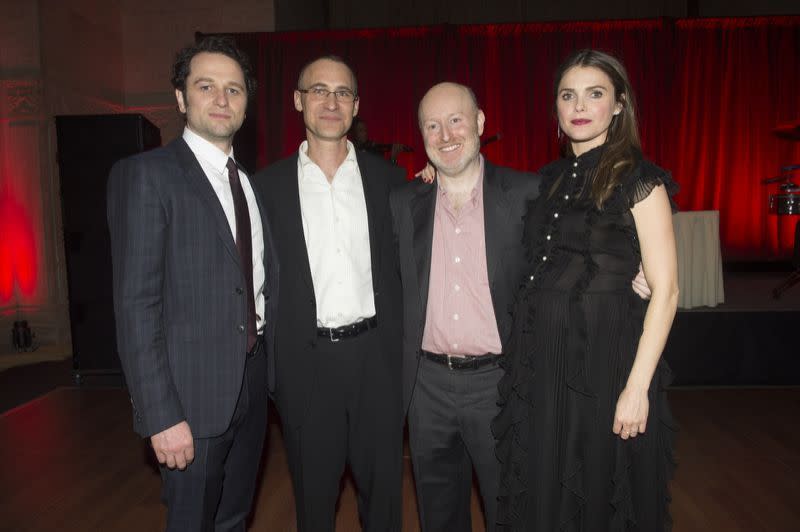
Matthew Rhys, Joel Fields, Joe Weisberg, and Keri Russell (Credit: Scott Gries/FX Networks)
The Americans showrunners Joe Weisberg and Joel Fields are in the TV spy biz, so they know plenty about trying to get answers from people. But instead of digging into a deep trunk of disguises or planning a long sting that leads to blackmail fodder, the Js decided to go the straightforward route and simply ask fans of their FX drama to submit answers to a series of questions the producers posed on Yahoo TV.
It’s no surprise that viewers of this smart, intense spy thriller/family and marriage drama had a lot of insightful things to say, and Weisberg and Fields provided equally smart and interesting responses to fans’ answers, including examples from the series and their own lives… and giving us some juicy nuggets to chew on — like why we all seem to not only be okay with, but rooting for, the murder of Pastor Tim. It’s the perfect thing to get you in the mood for tonight’s “The Magic of David Copperfield V: The Statue of Liberty Disappears,” a stellar, game-changing installment that is also the first episode of The Americans directed by star Matthew Rhys.
Related: ‘Bates Motel,’ ‘Once Upon a Time,’ and ‘Hannibal’ Showrunners Ask the Fans
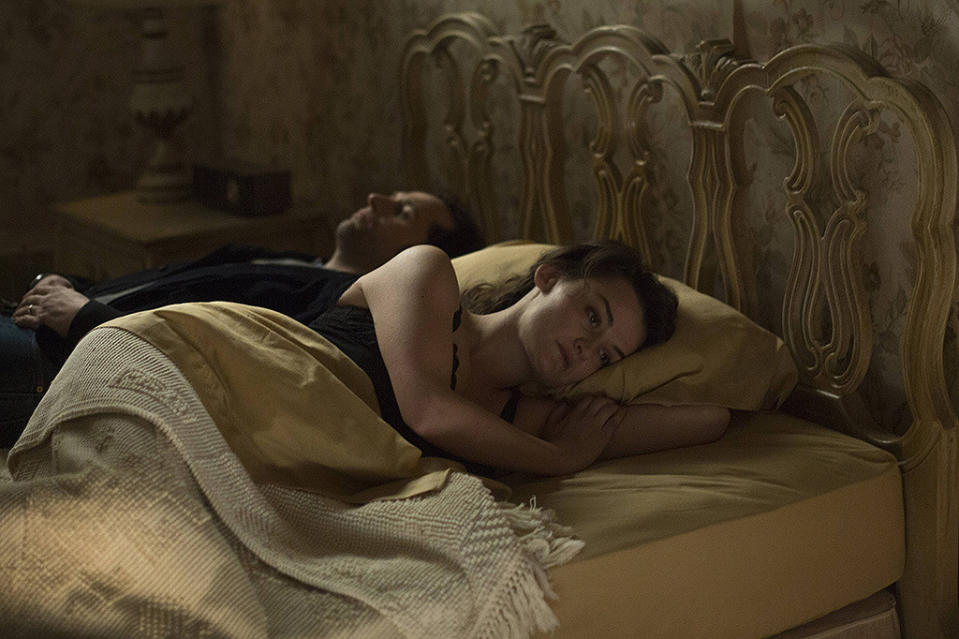
(Credit: Eric Liebowitz/FX)
JOE WEISBERG AND JOEL FIELDS ASK: Are secrets necessary to sustain relationships?
ANALYZING THE ANSWERS: Fans’ responses to this question suggest most of them don’t see things as being strictly black-and-white. Alex W. wrote, “I don’t know [that they’re necessary], but they are probably inevitable, not only in romantic relationships/marriages, but probably in all relationships… at work, for example, I have co-workers with whom I will discuss politics and those with whom I won’t, just as I have coworkers around whom I will swear and those around whom I would not.” From Lisa B.: “Some things may need to be kept secret to avoid irreparable damage to the relationship.” Maya T. sees it less as an issue of secrets, and more about the need to have an interior life, writing, “Yes, I believe secrets are necessary to sustain relationships. It is naive to believe they are not… sometimes we need to go through certain experiences to learn and grow — it is a mistake to share everything with a partner especially if it will hurt them.”
Of course, there are those who do think secrets can only lead to relationship woes. Heidi J. wrote, “Secrets between the people? Yes. Secrets from the other person? No.” And Guy K. is even more resolute: “Absolutely not! Successful marriages have NO secrets! I have been married 22 years, and have no secrets.”
WEISBERG AND FIELDS RESPOND: “I think, as with all of the things that really interest us in this show, different answers are simultaneously true,” Fields says. “For me, the most dangerous secrets are the ones we keep from ourselves. If we tell ourselves that we have to not have secrets from anybody else, we’ll invariably start keeping them from ourselves. To me, the greatest place to start is the challenge of self-scrutiny. If we can be honest with ourselves, then we have a hope within our relationship, and then from there, I think, as honest as we can be in relationships, the better they are. I don’t think they’re necessary for a relationship, but I think denying they are a part of life puts one on the path, potentially, to hiding things from the most important person.”
Weisberg: “I remember about 20 years ago I read an interview with Kenny Loggins. He talked about how he and his wife had gone [through] this program where they told each other every single thing they thought or felt. If one of them thought the other one looked ugly in the morning, they were like, ‘You look ugly this morning.’ I remember reading that and thinking, ‘That’s not a good idea.’ I don’t know if this qualifies exactly as secrets, but I think people do have to have private, interior lives where they think and feel things and don’t share everything with a partner.”
“Which is slightly different than failing to tell your new wife that you’re actually a KGB agent operating under an assumed identity and the marriage is fake,” Fields jokes. “I also think there’s a big difference between thoughts and actions, and that extends to secrets. There’s a big difference between what Joe calls the interior monologue, which we all have — alas, mine is far too boring to share every detail of, I’m sure. That’s not a matter of sparing my wife secrets, it’s a matter of sparing her the boredom of my interior monologue.”
Adds Weisberg, “That’s very different to how one comports oneself in the world.”
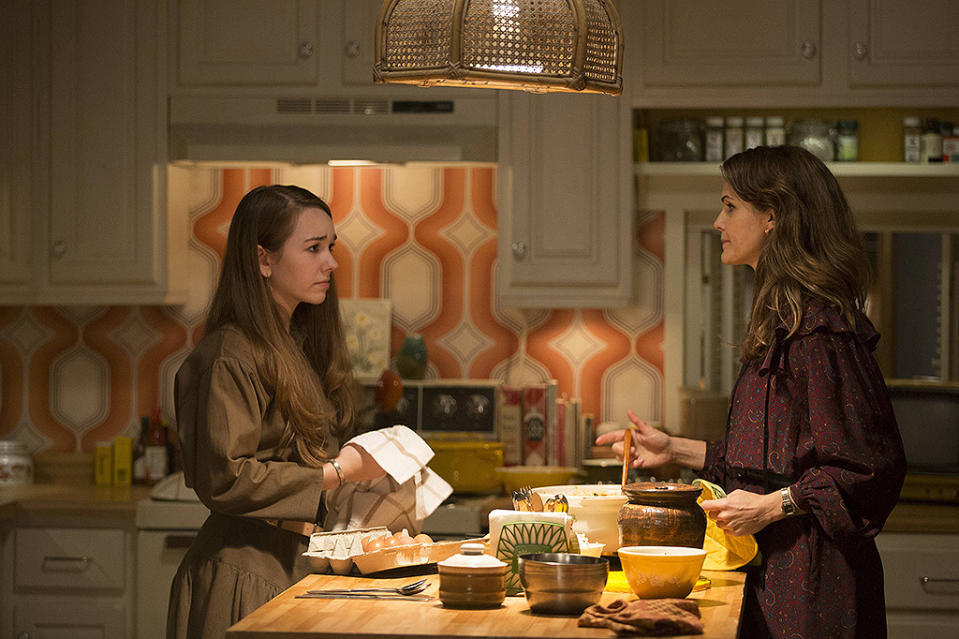
(Credit: Eric Liebowitz/FX)
JOE WEISBERG AND JOEL FIELDS ASK: Do parents need to keep secrets from their kids?
ANALYZING THE ANSWERS: Most fans were in agreement on this one: it’s up to parents to decide what they should keep from their children, but there are things that should be kept from them. Wrote Brian G., “[For] certain secrets… the child would probably need the experience and understanding of being an adult themselves. Beyond that, a kid typically only views their parents as either ‘mom’ or ‘dad,’ not just a flawed individual.” From Melissa M.: “Absolutely. Because children are so ego-centric and self-absorbed (not in a morally degenerate sort of way, but in a developmentally-appropriate sort of way), they see hardships and problems as their fault. Their brains can’t process that things happen in their life that aren’t directly caused by them.” And Joseph W. added, “I think parents do need to keep secrets from their kids, just as kids should keep secrets from their parents. No matter how much parents want to be their kids’ friends, and no matter how much kids want to act like adults, they are simply different. Important things shouldn’t remain a secret, but the little things don’t necessarily have to be shared all the time. It’s almost like a mutual respect. I also think it could actually be unhealthy if every single detail about your life is shared with your kids and visa versa.”
But Guy K., who wrote about absolute transparency in response to secrets in a marriage above, thinks the same level of honesty should also be present between parents and children. He wrote, “Absolutely not. We tell our kids everything. If they are old enough to ask, they are old enough to receive an honest answer. When a family member went to jail, we tried to keep it a secret from the kids, but ultimately it was just too hard on the family [kids tend to think whispers are about them, and get paranoid], and we told the kids everything.”
WEISBERG AND FIELDS RESPOND: “I think that’s pretty smart. I think that also has limits to it,” Fields says about Guy K.’s answer. “I think, generally speaking, you want to be truthful with kids pretty much all the time, but I find it hard to believe that there aren’t times that you want to keep secrets from kids because they’re not yet old enough to know some things. Kids will ask for the gory details of things possibly before they’re old enough to know them. I think it’s okay as a parent to hold some of that back, but you’re not going to hold it back forever. You’re going to make a judgment about when they should know.”
Says Weisberg about Guy K.’s call for total honesty with children, “I think that’s a very insightful and thoughtful response. Personally, one of the things I struggle with, as silly as it sounds, is should the Tooth Fairy be kept a secret? Should I lie to my child about the Tooth Fairy, because they take such pleasure in that little magical moment of childhood? Everybody kind of gets that fun. They probably know it’s all about fun, but on some level, I can’t help but feel that I’m being dishonest with my child, and I don’t want to. I’ll also say what I think is so insightful about [that] response the person wrote about his family member is, there are ways of being honest without giving all of the gory details. When one of my kids asks for something and I feel they’re not ready for all the specific details, I will say to them, ‘Look, I don’t think you’re ready for all the details of that. Here’s what I can tell you now, and when you’re older I can tell you more.’ That seems to be working so far.”
Weisberg’s also onboard with Brian G. “The sooner my kids figure out I’m a flawed individual, the happier I’m going to be,” he jokes. “I tell them that all the time.”

(Credit: Craig Blankenhorn/FX)
JOE WEISBERG AND JOEL FIELDS ASK: How does Philip and Elizabeth’s marriage make you think about your own?
ANALYZING THE ANSWERS: The most interesting, and common, answers to this question revealed how fans of the show see the parallels between their lives and the Jennings’. Not in a “we’re married spies who sometimes have to have sex with other people for the job”-kinda way, of course, but in the ways that The Americans is really about the relationship of this couple with extraordinary job pressures. “Honestly, that’s our favorite thing about the show,” Weisberg says. “It really is. We feel that when you take the espionage out of it and people can relate, particularly things in their marriages and their families, we feel like we’ve done a good job.”
As for specific responses from viewers, Stiver36 wrote, “Everyone has faces they put on [with] different scenarios/people. I have a ‘married’ face and a ‘work’ face, just like Philip and Elizabeth. The series made it more apparent [to me].”
Mary T. wrote, “I relate to the sense that they are together… and co-parenting, but at the same time, they are living these other lives. I think we don’t realize how much we can compartmentalize the different parts of our lives until it happens to us.”
And Joseph W. wrote, “I’m not married, so I can’t speak about my marriage, but it does amaze me that despite the constant clashing and extramarital affairs, there is an undeniable trust between Philip and Elizabeth. They both know every decision that the other makes is for the good of their family and the KGB.”
WEISBERG AND FIELDS RESPOND: “I heard somebody say something really interesting along similar lines,” Weisberg says. “They said that it’s very common that there’s a pattern where people either hold their s–t together at work, but not at home, or hold their s–t together at home, but not at work.”
Says Fields, “Very insightful answers. It reminds me of an interview I read recently with an author who was talking about how he is periodically recognized. He doesn’t think of himself as a famous person; he just thinks of himself as somebody who is periodically recognized. What he was saying is sometimes he’ll be finishing a meal at a restaurant and the waiter who’s been serving him will say, ‘Oh, by the way, I read such-and-such, and I really liked your work.’ Then, he would immediately think back over his whole experience at that restaurant and think about how he behaved and how he treated that waiter. What’s interesting about that is this question of, do we have these different faces? Would we want to be one way if we were recognized and another way if we’re anonymous?”

(Credit: Patrick Harbron/FX)
JOE WEISBERG AND JOEL FIELDS ASK: Do the ‘80s seem like a better or worse time to live?
ANALYZING THE ANSWERS: “The show makes me nostalgic for the ‘80s, which is when I was in high school,” Alex W. wrote. “Among the many things I love about the show, the excellent re-creation of that period of time is one of the most notable. You really do a great job capturing the look and feel, and I think we the viewers fill in the zeitgeist of the ‘80s with our imaginations.”
Lisa B. wrote, “It WAS a better time for many reasons. For one thing, the Cold War never seemed tangible like the terrorism of today is.”
Heidi J. said, “I suppose better: less outside influence (celebrities, friends via social media), [we were] less connected to everyone and everything all the time. Plus, I was less scared of the Cold War than I am of the current radical groups.” And F. De Gagné summed it up in this pithy, but deep response: “Yes, it was less noisy in the ‘80s.”
WEISBERG AND FIELDS RESPOND: “That’s very kind,” Weisberg says about the shout-out to the show’s attention to period detail. “We’re certainly very obsessive about it. It’s nice to know that that’s bleeding through.
“And actually, that pithy response about [the ‘80s] being less noisy, I think it’s a smart response also, because it goes beyond the simple meaning of the word ‘noisy.’ It was a time without email, without texting, without cellphones. Our lives were less noisy, and they were less cluttered, and we were able to focus more on singular things.”
On the sense that the ‘80s seemed safer from international violence than modern times, Weisberg says, “Joel and I feel differently about this… he talks a lot about feeling that those nuclear weapons were very tangible and could have dropped on us at any moment. I never felt that. I always felt like, ‘Eh, there are nuclear weapons, and they’re not coming.’ I feel like the terrorism today is more tangible, so I agree with that.”
Adds Fields: “I watched The Day After, and I was pretty convinced that that s–t could happen at any moment.”
“The Day After,” by the way, is the title of the May 11 episode of The Americans, and the 1983 TV movie of the same title — the nuclear destruction-themed movie that scared the bejesus out of so many of us who watched it when it originally aired — is on the Jennings family’s channel surfing list in the episode.

(Credit: Eric Liebowitz/FX)
JOE WEISBERG AND JOEL FIELDS ASK: Is it weird to root for “the enemy”?
ANALYZING THE ANSWERS: “I don’t think it is any more weird than being sympathetic toward, say, the Corleone family in The Godfather movies, who were, after all, terrible people who deserved to go to prison for their many crimes,” Alex W. wrote. “I wouldn’t say that I am ‘rooting for’ Phillp and Elizabeth, per se, in an operational or political sense, but I am sympathetic toward their humanity,” Alex W. wrote.
From Gary O.: “No, it’s strangely therapeutic and exciting. Seeing the other side as having a cause they genuinely believe in breaks the good vs. evil illusion we grow up under. The military industrial complex on both sides serves as the true villain. And hiding in full sight in America is just plain edge of the seat fun.”
Jennifer A. added, “We’re rooting for people, for a family, for a marriage,” as opposed to rooting for an “enemy,” while Melissa M. expanded on that idea, writing, “Yes and no. Personally, I’ve tried hard to identify and reject American exceptionalism, and the notion that just being a citizen of one country makes you morally superior to citizens of other countries. It’s weird to root for Phil and Liz not because of their communist roots and tenets, but because they’re doing horrible, horrible things.”
From Jan B.: “I really don’t root for any of the KGB folks. Yes, at times, Philip’s almost turned me, but ultimately, with how he’s played, or had to play, Martha, I could never root for him. And given that Elizabeth and Philip have been living this lie and subjecting their innocent kids to it, well, that’s just not for me.”
And Mary C. said, “Yes, but lately I am rooting for the U.S. I’m glad Stan is finally putting things together.”
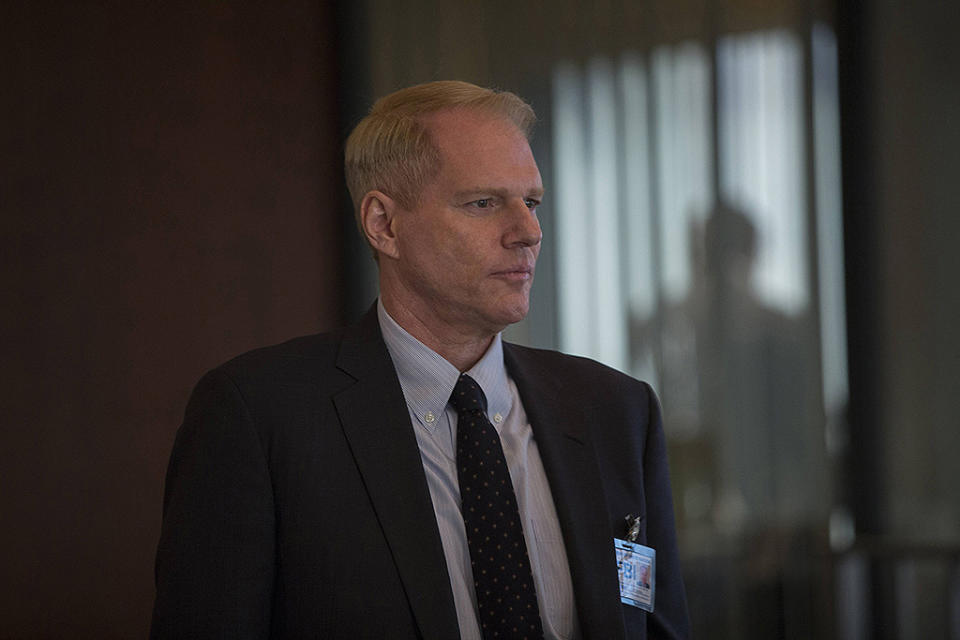
(Credit: Eric Liebowitz/FX)
WEISBERG AND FIELDS RESPOND: “Unlike the Corleone family, at the end of the day, Philip and Elizabeth, even if you don’t agree with their personal philosophy or politics or morality, they at least have a personal politics, philosophy, and morality. That’s better than just being a gangster, I suppose,” Weisberg says.
He is also happy to hear some appreciation for oft-hapless FBI guy Stan: “Go Stan! You know, Stan’s had a rough time. That guy usually ends up on the losing side of things. We’ve gotten feedback on that. It does feel good when things fall his way, both personally and plot-wise.”
“I’ll just say we like those answers,” Fields says, adding in response to Jan B.’s criticisms of Philip and Elizabeth, “I’d say that’s a fair response also. I don’t think there’s anything wrong with that on the emotional spectrum.”
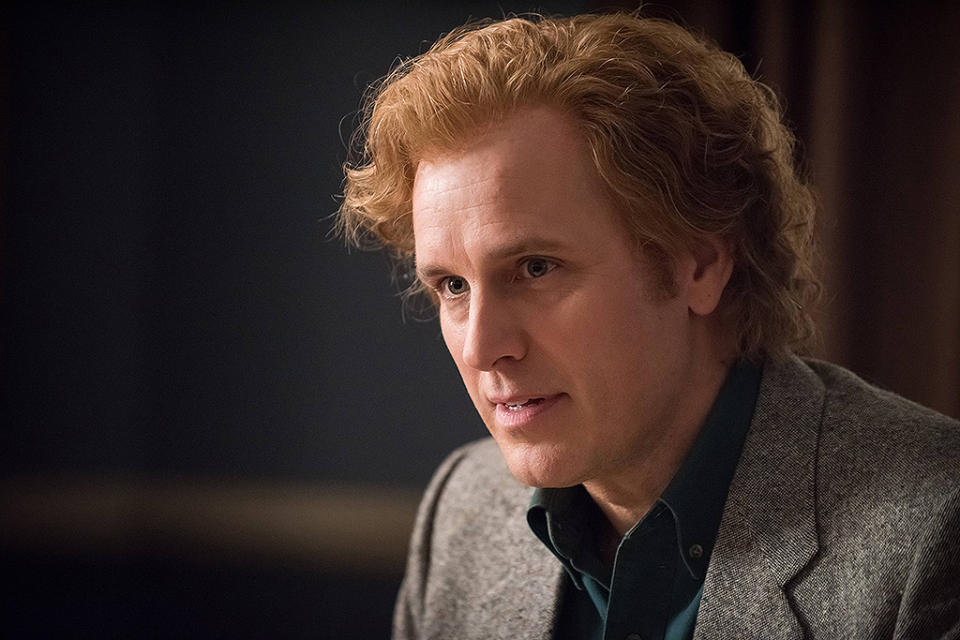
(Credit: Jeff Neumann/FX)
On the Pastor Tim front, Fields calls the desire for Pastor Tim to meet violence, or death, shocking, but adds, “What’s interesting about that, it’s very easy to see how our emotions can get triggered to such extremes. If you think about it, what has Pastor Tim done but be inconveniently located in the wrong church proximate to this family? Then, be as open and supporting as humanly possible. Yet the feeling is that he should be killed. Talk about rooting for the enemy… it’s interesting to see how easy it is to trigger the thing that kind of starts to dehumanize him, to make it okay to [think the KGB should] kill him. He seems weird. He seems creepy. You can immediately put all of these things on him that, if you step back, aren’t really there, because you want to feel a certain way. There’s an outcome that would seem satisfying. It’s very human and disturbing. I think, at their core, if all is going well with the show, then the audience is relating to this family. You want to root for a family. Pastor Tim’s character now is a threat to this family. If you care about a family, you want to get rid of any threats to what you care about. Often you start telling yourself a story that justifies doing that.”
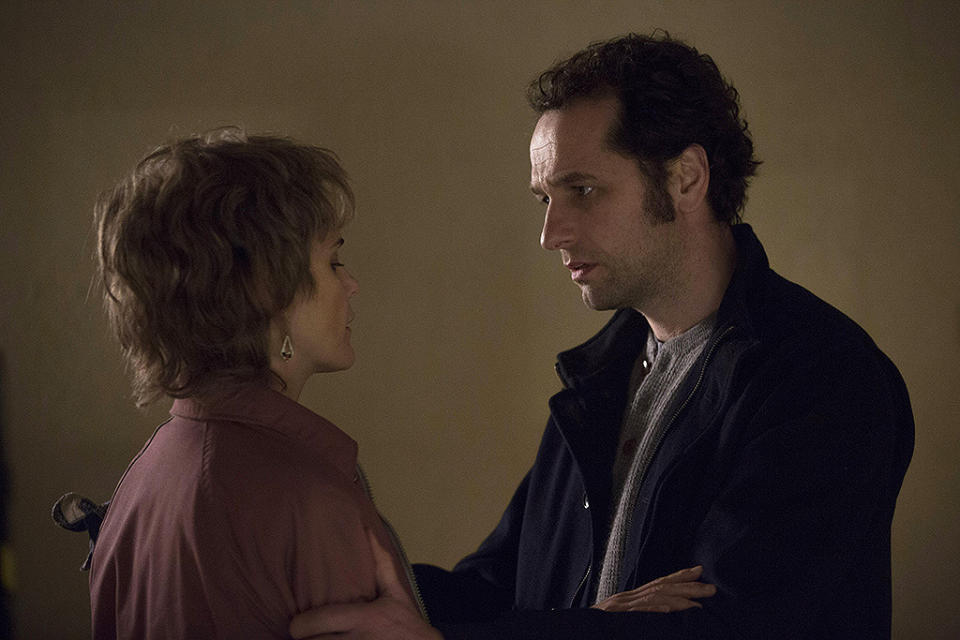
(Credit: Eric Liebowitz/FX)
JOE WEISBERG AND JOEL FIELDS ASK: Does the show change your feelings about the Soviet Union?
ANALYZING THE ANSWERS: Most fans agreed the show has provided food for thought, even if it hasn’t completely changed their perceptions about the Soviet Union. Lisa B. wrote, “It actually has enlightened me about issues I never paid attention to when I was a teenager in the ‘80s,” while Joseph W. added that “the show does give them a bit of humanity.”
And Caryln L. wrote, “The Soviet Union in the show seems almost like a character and not at all like the Russia/foreign policy issues, as we know today. It isn’t until Reagan comes on TV and Elizabeth gets really annoyed by him that I’m brought into the Cold War mindset.”
WEISBERG AND FIELDS RESPOND: “Ha. Well, good,” Weisberg says. “I think there’s something nice about that disappearing and reappearing over the course of the show.”
And, “Well, okay…” is Fields’ response to Mary C.’s answer that, “No, I think they are still a cold, inhumane country.”
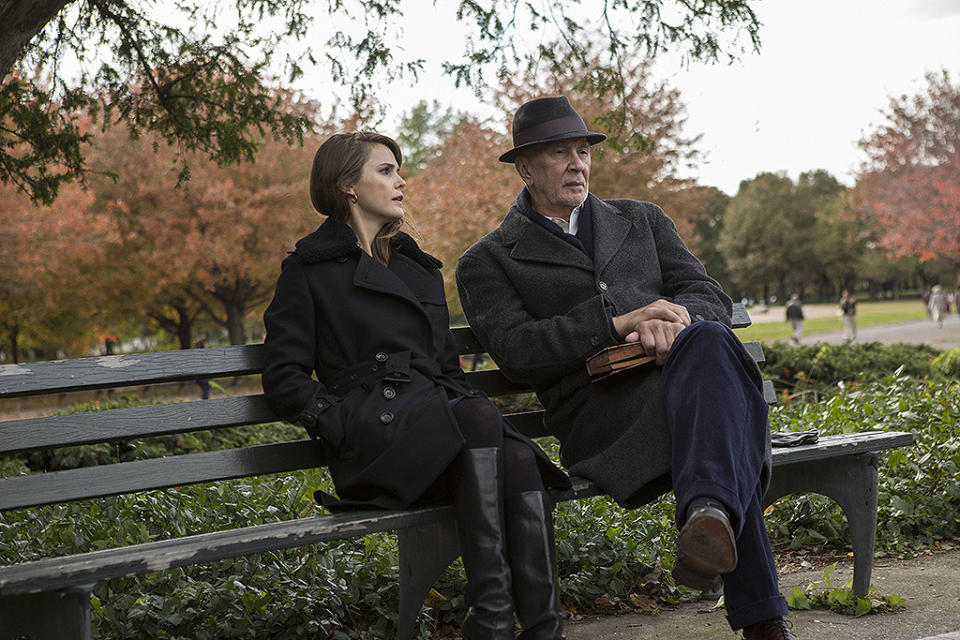
(Credit: Eric Liebowitz/FX)
JOE WEISBERG AND JOEL FIELDS ASK: Do you ever feel like a spy in your own life?
ANALYZING THE ANSWERS: Many parents answered that they often feel like spies while trying to keep up with their children, especially their teenagers.
And Alex W. summed up what many fans wrote, that he often feels like he’s being spied on. “As a physician, I am trained to observe people’s appearance and behavior. Often I end up being the keeper of a lot of intimate secrets of my patients,” he wrote. “Aside from matters related to work, I am aware that we Americans now live in a surveillance state… even if I am not personally the subject of surveillance, I have the knowledge that the [government] has the power and inclination to intercept communications, and that has changed my outlook on personal freedom, politics, and life in general.”
WEISBERG AND FIELDS RESPOND: “I’ve certainly been aware in the past decade now how many people feel that way,” Fields says of people feeling as though they’re under surveillance while going about their everyday lives. “I feel that way so little, even though I recognize the empirical truth about how much those things have changed. It’s not like I think those people are crazy; I don’t feel it myself.”
Weisberg’s take on the matter: “The thing that strikes me about that arena, it seems that somehow society has made this full circle, where we all started living in these small communities where everybody knew everybody’s business. Everybody knew everybody and everything about everybody. Then, we migrated to these big cities where people became anonymous. You got the benefit of anonymity and being able to create and re-create who you were. You had a real loss of connection. Now, with technology… we’re sort of back into this place where there are more cameras and there’s more connection. Everybody is starting to know everything about everybody again. Whether it’s good or bad, it’s interesting that in some weird technological sense, we have returned to this world where you’re all interconnected. In some combination of the best and the worst of all of it.”
Two more stand-out responses: Brian G. wrote, “At times, yes; not because my secrets are threatening to my nation or my family, but [because] there are precious few people to whom I can take off my ‘Clark-like’ disguise and be open and honest. Says Fields, “I think that’s a very relatable sentiment. We all yearn for those few people in our lives with whom we can truly share ourselves.”
And Joseph W. wrote, “I feel like at work, you try to have the mindset of a spy to know what’s going on in your surroundings and figure out a way to advance your career with the intel you’ve collected.”
Says Fields, “That makes a lot of sense. You tend not to be as open at work as you are at home. I think that’s a thing we talk a lot about with the show, what’s the line between manipulation and normal behavior, of how you act with people when you have different agendas and some of your agendas you can’t be open about? Philip and Elizabeth do that in the service of espionage, and it gets called manipulation. If you just do it in the service of doing your job or getting ahead at work or accomplishing projects at work where you’re not going to be 100 percent transparent about every last thing you do all the time, that’s just normal human behavior without a derogatory word being attached to it.”
The Americans airs Wednesdays at 10 p.m. on FX.


